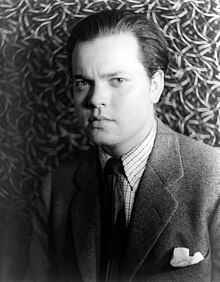Orson Welles
| Orson Welles | |
|---|---|

Welles on March 1, 1937 (age 21), photographed by Carl Van Vechten
|
|
| Born |
George Orson Welles May 6, 1915 Kenosha, Wisconsin, U.S. |
| Died | October 10, 1985 (aged 70) Los Angeles, California, U.S. |
| Cause of death | Heart attack |
| Resting place | Ronda, Spain |
| Alma mater | Todd School for Boys |
| Occupation |
|
| Years active | 1931–1985 |
| Spouse(s) |
|
| Partner(s) |
Dolores del Río (1938–43) Oja Kodar (1966–85) |
| Children |
|
| Parent(s) | Richard Hodgdon Head Welles Beatrice Lucy Ives Welles |
| Awards |
1941 Academy Award for Best Writing (Original Screenplay) for Citizen Kane 1970 Academy Honorary Award |
| Signature | |
George Orson Welles (/ˈwɛlz/; May 6, 1915 – October 10, 1985) was an American actor, director, writer, and producer who worked in theatre, radio, and film. He is remembered for his innovative work in all three: in theatre, most notably Caesar (1937), a Broadway adaptation of William Shakespeare's Julius Caesar; in radio, the legendary 1938 broadcast "The War of the Worlds"; and in film, Citizen Kane (1941), consistently ranked as one of the all-time greatest films.
Welles directed a number of high-profile stage productions for the Federal Theatre Project in his early twenties, including an adaptation of Macbeth with an entirely African American cast, and the political musical The Cradle Will Rock. In 1937 he and John Houseman founded the Mercury Theatre, an independent repertory theatre company that presented a series of productions on Broadway through 1941. Welles found national and international fame as the director and narrator of a 1938 radio adaptation of H. G. Wells' novel The War of the Worlds performed for his radio anthology series The Mercury Theatre on the Air. It reportedly caused widespread panic when listeners thought that an invasion by extraterrestrial beings was actually occurring. Although some contemporary sources claim these reports of panic were mostly false and overstated, they rocketed Welles to notoriety.
...
Wikipedia
